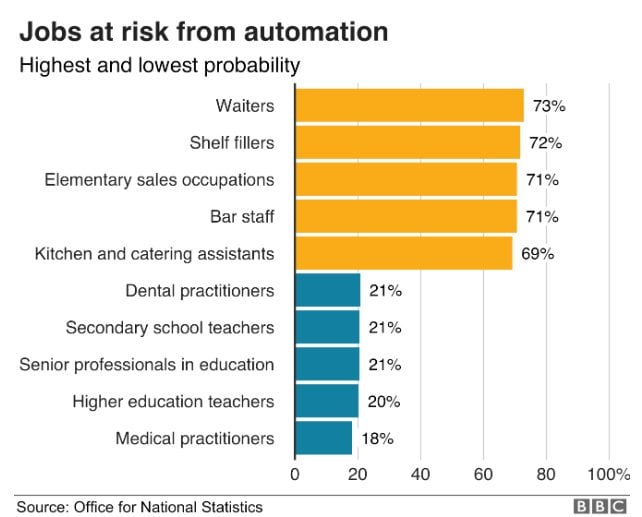Upskilling in the Age of Automation: Stay updated, stay relevant
McDonald's recently drew headlines as the global fast-food chain unveiled its plans to set up a 100% automated restaurant in Arizona with self-serving kiosks replacing cashiers.
In light of the rising minimum wage, the company has found that it makes economic sense to turn to robots and the added benefit of improved speed along with better hygiene.
Once technicians iron out the initial glitches, this system would spell higher profits. And the complete elimination of human fallibility would mean better service for customers.
Albeit over 210,000 people worldwide are currently employed at McDonald's. One in eight Americans has worked there at some point in their lives. What does this development mean for them?
People’s opinion of automation

McKinsey wrote a report in 2017 titled Jobs Lost, Jobs Gained. They stated that, in theory, we can automate roughly 50% of current work processes. All with the use of existing technology.
As expected, dissenters have met this possibility with an onslaught of doomsday predictions. Some lament, while others go as far as prophesying an apocalyptic AI takeover.
Albeit proponents of automation argue that these developments will create far more jobs. Even more, than they destroy. And boost productivity and growth.
The truth lies somewhere in the intersection of these two viewpoints.
Who is affected by this development?
Automation will increase efficiency. It will also lead to the creation of new, but complex job roles. Albeit, only people who are conversant with emerging technologies will benefit.
You can program a robot to do physical chores and follow a routine. So the first sufferers of redundancy would be those handling mechanical jobs.
BBC conducted a study earlier this year. The study showed that machines may replace waitresses and shelf-fillers next. Though new jobs may be created, there's no way these workers could fill them - they simply don’t have the skills.

The number of jobs available may even exceed those qualified to perform them. And this may lead to dichotomy. Where companies struggle to fill job positions, but thousands remain unemployed.
Willing but unable to work.
Preparing for change

The way forward seems clear. Efforts must be made to upskill the workforce. Failure to do so would be a colossal waste of human resources.
Employers have a significant role to play in this process. Technology development cycles often span years. And corporates could spend that time reskilling their employees.
In so doing, when the machines are ready, the workers would be waiting.
Both groups enjoy the benefits. It saves employers the effort of recruiting new personnel for future needs. While employees enjoy higher satisfaction in their improved sense of job security.
Qualifications for future work

Companies have shifted to competency-based hiring. Now, to qualify for selection, an individual must perform certain activities satisfactorily. So, in most cases, it’s not based on formal education.
This makes the prospect of upskilling even more attractive. Now abilities are trumping credentials. So the high cost of obtaining a traditional degree may no longer be a barrier to one's career growth.
Learning a skill requires an investment that is much lower in cost and time. And online education providers offer a plethora of options at compelling prices. You also have the convenience of learning from the comfort of your home.
The internet has democratized knowledge like never before. And many are taking full advantage of it.
Up until now, it was customary to select a career path and stick to it throughout your working lifetime. Albeit, the development of technology is happening at a fast pace.
To wrap up
Yuval Noah Harare wrote a book; 21 Lessons for the 21st Century. And he asserts that the only constant in today's world is disruption. He argues that it might one day be normal to undertaking 2-3 career changes over the course of a lifetime.
Upskilling is no longer for ambitious professionals alone. It’s now essential for anyone to stay relevant.
These are uncertain times, and nobody can predict what is to come. So, back-up plans are no longer optional, and complacency is fatal.
Like the popular saying of former Intel CEO, Andy Grove - "Only the paranoid survive".
